
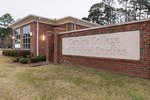

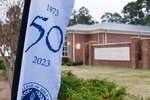
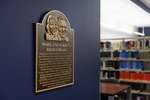

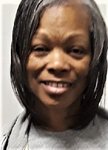

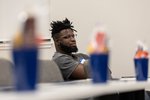
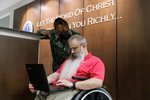
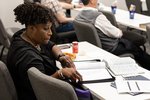
It began in 1973 as a pastor’s mission to teach the Bible in Fayetteville and surrounding communities.
It grew into a nondenominational college that offered courses and awarded degrees in biblical higher education.
In the 21st century, taking advantage of the internet and other technology, the college went from being a commuter school that drew students from a 50-mle radius to becoming an institution that could spread its message worldwide and in many different languages.
Cape Fear School of Theology was founded by the Rev. William L. Owens, then pastor of Village Drive Baptist Church. Now called Carolina College of Biblical Studies, the school will celebrate its 50th year with an anniversary banquet on March 17 at Cape Fear Botanical Garden.
The keynote speaker will be the Rev. William Franklin Graham IV, who goes by Will and is a third-generation evangelist, the son of the Rev. Franklin Graham and grandson of legendary evangelist the Rev. Billy Graham.
“I’m pleased to see where we’ve come from and excited to see what might be,” said Bill Korver, the fourth president of the college who has held the job since 2004.
One of the school’s major goals, Korver said, is to double enrollment over the next five years.
“Moving forward, our mission is using the Bible to train people to serve Christ all over the world,” Korver said. “If that’s our goal, then why in the world would we not train more people to serve Christ?”
The actual 50th anniversary is Sept. 10, the day in 1973 that records show the school held its first classes, said Provost Christopher Dickerson.
Your support for CityView helps ensure a more informed community. Donate today.
The institution
This semester, Carolina College of Biblical Studies has an enrollment of 180 students who attend in-person classes or take them online, according to Rodney Phillips, vice president of enrollment and student services. Of those, 38 are graduate students,
“The student body is ethnically diverse with approximately an even number of male and female students from a variety of evangelical denominations,” said Gary Barrett, director of institutional advancement.
The faculty includes four full-time employees, eight part-timers and about 40 adjutants who teach classes either in person or online, Phillips said.
The school offers six undergraduate degrees in addition to its graduate program, Phillips said.
According to its website, the school has a graduation rate of 67% and a 100% vocational ministry placement rate. The median class size is 12, with a 4-1 student-faculty ratio. Students come from 28 states, and the school has alumni in 17 foreign countries.
About 90% of undergraduates receive financial aid, and almost $40,000 in scholarships are awarded each year.
“Our main mission is, we exist to discipline Christ’s followers through biblical higher education for a lifetime of effective servant leadership,” Dickerson said. “And so our goals are to come alongside local churches to help train men and women for the ministry, but also for them to be productive members of society. Our vision is to help students launch and lead healthy ministries worldwide.”
The average age of the students is 45, which is trending downward, and the average student takes six to nine hours of classes per semester, according to Barrett and the school website.
“Part of our strategic initiative is working to improve that and connect with that younger audience,” Dickerson said. “If we train them sooner, they can serve longer.”
Tuition for undergraduates is $255 per credit hour; $235 per credit hour for a military personnel, their dependents and veterans; $295 per credit hour for a graduate student; and $265 for a military-connected grad student.
“We are a nontraditional student body,” Phillips said. “What we find is most of our students are medically or honorably discharged from the military or they retired from the military as well as other civilians who are coming back to finish a degree or change their vocation.
“But the challenge for a great number of them is they haven’t been in school for 20 or 30 years, so that’s where we try to provide a lot of help for them.”
The school's history
After Owens left the school in 1978 to take a pastor’s position in Charlotte, Ralph Richardson took over as its first president and led the school for 19 years, ending his tenure in 1997. During that time, the name was changed to Carolina Bible College. Under Richardson, the school added the degree program and moved from Village Drive to its current location at 8175 McPherson Church Road.
“He literally laid the foundation, in the sense that we didn’t have a building. He led them in purchasing the property we now sit on,” Korver said of Richardson. “He was responsible for pouring the foundation and helping to build the first superstructure.”
A plaque in a courtyard on campus recognizes Richardson for his accomplishments.
“When we started off, it was just kind of a small little school where you could come and take some classes. But now, it’s a more robust center of theological education,” Dickerson said. “Our byline or tagline is “Your Calling. Our Mission.” That’s kind of our theme. You have a calling; it’s our mission to help train you for that.”
Rick Oglesby took over as president from 1997 to 2000. He helped the school get permission from the Department of Veterans Affairs to gain access to military benefits.
Phil Stamm was president from 2000 until Korver became interim president in 2004. The school began offering online courses during Stamm's tenure.
Korver, who took over full time in 2004, launched the school’s bid for national accreditation in 2005, an eight-year process that culminated in 2013. The school changed its name to Carolina College of Biblical Studies in 2012. Korver also spearheaded construction of a new building.
After Richardson moved the school to its present location in 1978, classes were held in a block building that was constructed with the help of volunteers and students from Fayetteville Technical Community College, Barrett said. Korver then initiated a capital campaign to renovate the 7,500-square-foot building and add a 6,500-square-foot building, giving the college a total of 14,000 square feet to operate in, Barrett said. The new building was dedicated in March 2017 and cost $2.2 million.
The master’s program was launched in 2018.
Korver began teaching at the school in 1990 after movng to the area in 1989 to take over the ministry at Christ Community Church in Pinehurst.
“I had no intention of coming over here full time,” Korver said. “In 2004, the board asked if I would consider resigning my congregation over in Pinehurst to come over here full time. My wife (Marcia) and I agreed to that primarily because I thought if God could use me and CCBS just to train a few dozen people, it would be a good investment in my life.
“I thought I would never be able to do that as a pastor, though I enjoyed it a great deal. There’s an opportunity for me and for us to train folks and send them out to do what God was calling them to do. That was kind of the clincher for me.”
Korver said he now oversees a college with revenue of about $1.4 million per year — about $900,000 in tuition and $500,000 in gifts. He said the school spends or invests about $950,000 annually on personnel, building maintenance, and other operating expenses.
Today’s campus life
Two developments that have enhanced the school’s relationship with its students are the internet and a Bible translation program with Wycliffe Associates, a missionary group.
“The sole purpose is translating the Bible into other tongues around the world so this expands our reach even further,” said Phillips.
The online courses have allowed instructors to teach students who live outside the original 50-mile radius.
“Obviously, you’ve seen we have no sports teams, have no dorms. We only attracted people in surrounding counties,” Korver said. “Online, you can get students from anywhere in the whole world. So that was our desire, to reach beyond where we were without building dorms and sports teams and all that.”
It also helped the school get through the difficulties of the COVID-19 pandemic.
“COVID obviously threw everyone for a loop. But we didn’t have to shut the semester down,” Korver said. “With Zoom (sessions), you could be over on North Ramsey Street and Zoom in while drinking your coffee.
“(COVID-19) was not a huge disruption for us. It forced us to be a little more creative. Say, before you were an on-campus student or online student. The two didn’t mix. Now you can say you can be in one class (physically), Zooming the second class and be online for the third class. You can mix however you want to.”
The Zoom sessions also allow students to hear religious perspectives from outside the region.
“Professors who are outside the geographic region who have expertise, we can Zoom them in. We can Zoom that knowledge into the room so the students have the best training available,” Dickerson said. “… That person doesn’t have to live down the street.”
Getting accredited
Beginning in 2005, the school began the eight-year accreditation process.
“From 1973 to 2005, the board intentionally did not pursue accreditation,” President Korver said. “It was not because the board didn’t want to go through accreditation. But accreditation for a college is kind of like an audit for a bank or whatever. It’s really intense.
“The big fear with the board was, could CCBS be accredited without having the good folks at the U.S. Department of Education telling us what we could believe and teach to be accredited? Are they going to tell us you can’t believe in the Bible, can't believe in Jesus, whatever?”
The school decided to go through accreditation but with an understanding.
to the conclusion that we would pursue accreditation, but if the U.S. Department of Education would say, ‘This is what you can or cannot teach or believe,’ we would pull out of accreditation in a heartbeat.”
That didn’t happen, and the school was accredited in 2013.
What the students think
Current students range in age from 20 to 81, Barrett said.
Carolyn Wongus, 61, is originally from Toms River, New Jersey. She retired from the military in 2005 and said she wanted to read the Bible from Genesis to Revelations.
“I began reading the Bible on my own,” Wongus said. “I came by the school and saw the sign where it said how to study the Bible. I came and just started taking classes and getting basic information on how to study the Bible and what to look for.”
Wongus said she officially enrolled in 2012 and received her undergraduate degree in 2019. She is now in the graduate program.
“I don't know where the Lord has called me, to what he has for me to do just learning his word’”
she said. “He’s equipping me for something.”
Devon Guajardo, 32, of Fayetteville, said he wants to use his knowledge to teach God’s word to others.
“The end result is to be able to do the same thing they’re doing here and teach at a college professor’s level,” Guajardo said. “I’m being called to minister and teach in general. I want to be able to teach with more understanding than what I have now and further my education.”
Student-teacher interaction
Both students and teachers say the intimate atmosphere enhances the educational experience.
Most of the facility are “pastors and preachers and scholars by day and teach with us by night, if you will,” Dickerson said. “So, they’re practitioners; they know what they’re doing. They bring a sense of knowledge and practical learning to our students, which I think is really healthy rather than just being professors who read books and just sit in their offices all day.”
Thomas McCuddy, a family pastor at Cape Fear Baptist Church in Gray’s Creek, has been teaching at the school for 12 years. Though he is currently taking a semester off as the school’s director of professional studies, he has taught as many as four classes a week and plans to teach two days a week beginning next semester.
“The first five years I taught, I was the youngest person in class,” the 42-year-old McCuddy said. “For most of these older students, there is a coming alongside of what they’re already doing because they’re already pastors; they’re already in ministry many times.”
Wongus said she had come a long way since she her first class in 2005.
“It really is more of a family vibe because everyone is willing to help you,” she said. “The professors go out of their way to make sure that you understand the subject you are learning. It’s nothing like I’m going to give out a pop quiz and, ‘I gotcha.’ It doesn't set you up to fail. It sets you up to succeed.”
The future
With a goal of doubling enrollment over the next five years, administrators are seeking ways to attract younger students.
“We’re very much, in many ways, mentors compared to just simple professors,” McCuddy said. “That’s what keeps me here, not just the teaching component. I know my students’ names, I know their backgrounds, I know their struggles.
“Sometimes they have personal life struggles that they’ll share because it affects their classwork, but they feel comfortable letting me know. So there’s some times I have to tell them, like, ‘OK, I’m talking to you as your professor; but other times, I’ll talk to you as a pastor.’”
Alexis Cook, 27, is one of those younger students. She is from St. Pauls and is pursuing a degree in biblical studies. She said her end goal is to pursue a career in Christian counseling.
“I want to dig deeper, get to know God’s word better,” Cook said. “I’m a first-generational Christian, so I didn't have Grandma (taking me to church). I didn’t have Sunday school. Part of the reason I’m here is I feel like I’m catching up.”
Cook said she attended Pitt Community College in Greenville, but the campus seemed too big compared to her high school.
“This just seems very intimate and really small. I don’t always have to go to an adviser for everything,” Cook said. “I know that my professors are like-minded people. It feels like they actually care, not just about my work but spiritually and where I am. I can literally go right to the professor.”
Joel Sailer, 27, traveled from Rapid City, South Dakota, to visit the school on Feb. 13. He lived in North Carolina for a year and found information about the school online.
“One thing that stood out for me was that it was a nondenominational Christ center and relationship-based. That was really an attention-grabber for me,” Sailer said. “I feel like I’m being led by the spirit, like it’s my calling to teach and preach and share the gospel of grace with others. It’s similar to if you’re trying to learn karate: you can only learn so much on your own before you need a sensi.”
Sailer said he was considering other schools but likely would begin taking online courses at Carolina College of Biblical Studies.
“I haven’t found anything that suggests that it’s anything less than what it'’ presented to be,” he said.
One way CCBS President Korver is hoping to attract younger students is by recruiting among home-schooled and co-op students as well as at Christian schools, public high schools and the six community colleges in the area.
“We’re not trying to steal their students. When you finish at Fayetteville Tech, either your education is over or you have to go somewhere else,” Korver said. “The idea is if you have to go somewhere else, if you’re a good mission fit, (then come here). We don’t believe that everybody is interested in what we are.
“If you’re interested in becoming a cosmetologist or fireman, that’s not who we are. But if you’re interested in spiritual things, maybe this is a place you can come.”
For the 27-year-old Cook, Carolina College of Biblical Studies is the right fit.
“I want to go out into the world and make disciples,” she said. “I just plan to do that, and this is going to equip me to do that well and to have confidence in knowing that I’m giving out the right information in making disciples. You can’t give what you don’t got.”
As for Korver, the 63-year-old says he’s not ready to retire just yet. He plans to work another five years or so, making him the school’s longest-serving president.
“I’m not content to say we’ve arrived,” Korver said. “We still have things we want to accomplish.”